Undercover federal agents arrested a U.S. citizen planning an attack on the Pentagon and U.S. Capitol using large remote-controlled planes loaded with C-4 explosives.
Rezwan Ferdaus was also charged with attempting to provide material support to Al Qaeda, in order to carry out attacks on U.S. soldiers overseas, the Justice Department announced.
The 26-year-old Ferdaus, a resident of Ashland, Ore., was arrested in Framingham, Mass. Ferdaus was arrested by undercover FBI operatives.
A federal affidavit alleges that Ferdaus, a Northeastern University graduate with a degree in physics, began planning to commit a violent "jihad" against the U.S. in early 2010. He obtained mobile phones, each of which he modified to act as an electrical switch for an IED. He then supplied the phones to FBI undercover agents, who presented themselves as recruiters for Al Qaeda. Ferdaus believed that the devices would be used to kill American soldiers overseas.
During a June meeting, he appeared gratified when he was told that his first phone detonation device had killed three U.S. soldiers and injured four or five others in Iraq. Ferdaus responded, "That was exactly what I wanted."
According to the affidavit, after each subsequent delivery, Ferdaus was anxious to know how well each of his detonation devices had worked and how many Americans they had killed. During recorded conversations, Ferdaus stated that he devised the idea of attacking the Pentagon long before he met with the government's cooperating witness and undercover agent, and that his jihad had, "started last year."
In recorded conversations with the witness that began in January, Ferdaus stated that he planned to attack the Pentagon using aircraft similar to "small drone airplanes" filled with explosives and guided by GPS equipment. In April, Ferdaus expanded his plan to include an attack on the U.S. Capitol.
In May and June, Ferdaus delivered two thumb drives to the agents, which contained detailed attack plans with step-by-step instructions as to how he planned to attack the Pentagon and Capitol. The plans included using three remote controlled aircraft and six people, including himself, whom he described as an "amir," which is an Arabic term meaning leader.
During various recorded meetings, Ferdaus envisioned causing a large "psychological" impact by killing Americans, including women and children, who he referred to as "enemies of Allah." His desire to attack the U.S. is so strong that he confided, "I just can't stop; there is no other choice for me."
In May, Ferdaus traveled from Boston to Washington, D.C., where he conducted surveillance and took photographs of his targets (Pentagon and Capitol). He identified and photographed sites at the East Potomac Park from which he planned to launch his aircraft filled with explosives. Upon his return, Ferdaus told the agent that "more stuff ha[d] to be done," that his plan needed to be expanded, and that he had decided to couple his "aerial assault" plan with a "ground directive."
Ferdaus indicated that his ground assault plan would involve the use of six people, armed with automatic firearms and divided into two teams. Following the aerial assault, Ferdaus said, "we can effectively eliminate key locations of the P-building then we can add to it in order to take out everything else and leave one area only as a squeeze where the individuals will be isolated, they'll be vulnerable and we can dominate."
Once isolated, Ferdaus planned to "open up on them" and "keep firing" to create "chaos" and "take out" everyone. He also provided the expanded plan to the agent on a thumb drive.
Between May and September, Ferdaus researched, ordered and acquired the necessary components for his attack plans, including one remote controlled aircraft (F-86 Sabre). Prior to his arrest, Ferdaus received from the agent 25 pounds of what he believed were C-4 explosives, six fully-automatic AK-47 assault rifles, and grenades. In June, Ferdaus rented a storage facility in Framingham, Mass., under a false name, to use to build his attack planes and maintain his equipment.
In August, the F-86 remote controlled aircraft was delivered to the Framingham storage facility. Ferdaus delivered a total of eight detonation devices to the agents during the investigation that he built with the intention that they be used by Al-Qaeda operatives overseas to kill U.S. soldiers. On Sept. 20, Ferdaus made a training video, which he provided to the agents that showed how to make "cell phone detonators."
At a Wednesday meeting, the agents allowed Ferdaus to inspect the explosives and firearms that the agents delivered, and that Ferdaus had requested for his attack plan. After inspecting the components, Ferdaus brought them to his storage unit, took possession of the explosives and firearms, and locked them in his storage unit. Ferdaus was then arrested.
Ferdaus was presented with multiple opportunities to back out of his plan, including, being told that his attack would likely kill women and children, according to the affidavit.










